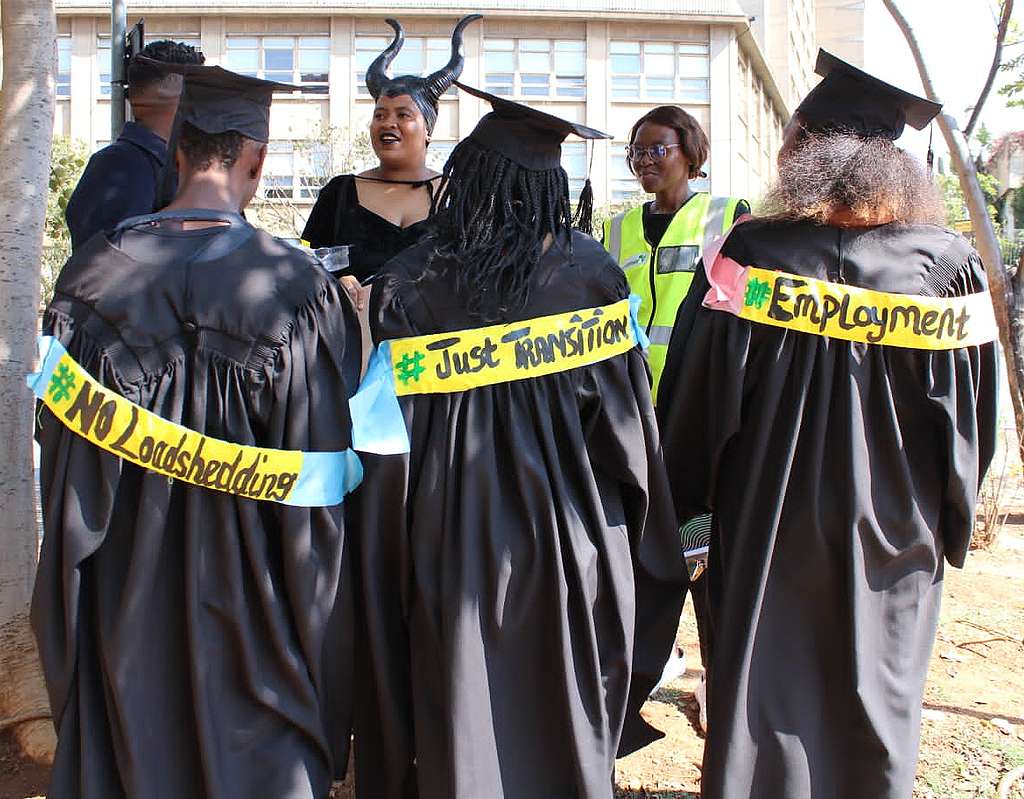 Eco Shape Shifters and Ubuntu Hub activists protesting against load shedding in Johannesburg, South Africa © Andile Mlambo / Ubuntu Hub
Eco Shape Shifters and Ubuntu Hub activists protesting against load shedding in Johannesburg, South Africa © Andile Mlambo / Ubuntu HubIn South Africa, Common Power is uplifting community energy initiatives by young professionals to help address the energy crisis.
Since the start of South Africa’s energy crisis in 2007, we’ve experienced multiple waves of load shedding as the country’s demand for electricity exceeds its (fossil fuel -based, corporate) ability to supply. Also known as ‘rolling blackouts’ or ‘rotating outages’, load shedding describes when an energy utility company artificially reduces demand on the energy generation system by temporarily switching off the distribution of energy to certain geographical areas.
During these periods the power is rationed between different electrical grid areas across the country and within municipal areas, with some experiencing power outages typically lasting two to four hours.
The cause and cost of South Africa’s energy crisis
In South Africa, the need for load shedding has been attributed to mismanagement in the construction of power stations and generators, acts of sabotage, and corruption within the South African Government and the government-owned national power utility and primary power generator, Eskom. Although South Africa has a national grid, some areas of the country experience more load shedding than others due to differences in local power generation capabilities and difficulties in electrical distribution.
Load shedding poses a series of challenges that take a heavy toll on ordinary South Africans. “Load shedding has inconvenienced me, like when I need the power to warm up the house,” says Avuziwe Mfeka, a Chemical Engineering graduate. “Also, we are traumatised by this because barely a day goes by without worrying about when there will be load shedding.”
It also drives electricity costs higher. “These increases have not only made it expensive to live but also apply pressure on communities and, to a greater extent, families,” notes Abongile Gogo, a medical laboratory technician student. “Climate change and the rise of energy costs have affected us all, yes, me and my family as well, the electricity bill is high,” adds Luvuyo Mdepha, an environmental studies graduate.
The increased cost of living and electricity makes life for these students and young professionals increasingly difficult. Most of them are educated and boast one or more degrees, but they have not been able to find jobs due to historical and ongoing corruption that has exacerbated South Africa’s unemployment crisis.
Solar solutions
The Community Energy Accelerator (CEA) is a solar project design course that starts with basic concepts of solar energy technologies, and goes on to equip participants with in-depth skills and knowledge on solar project design, contracting, and development. The educational programme combines face-to-face training, e-learning tools, and access to support teams and expert partners. Their “Change Makers” pathway is a starting point for trainees who previously have zero or close to zero knowledge and experience in renewable energy technologies.
In collaboration with Greenpeace Africa, Common Power has launched a pilot programme to recruit and train a team of experienced developers – who will go on to mentor others – in the development and delivery of the first community solar and batteries project.
For Abongile Gogo, one of the participants, “to be involved in a project that brings change to the game is great”. Chitola Mufali, a fellow trainee, enjoys how the CEA creates a space that democratises access to energy and empowers communities.
Avuziwe says the project will help her community: “My community, and the next generations will have a place preserved for them. Employment will definitely be created as different skills will be required, but the beauty of this is that people will start companies, and there will be no job favours. With this independence, people will start to decide how to use power, as sunlight generates electricity, giving someone a sense of liberty. The most important part is feeling independent and untouched by load shedding.”
Lucy Mofokeng, another CEA participant, says she “would like to tap into green energy solutions that are affordable”. Sharpening their business acumen, their digital skills, financial project management and community engagement experience are some of the added benefits listed by trainees.
“There are solutions to load shedding, but no steps are being taken for those who need it. I want to be one of the many pioneers to take those steps. My message for those who want to join, especially the youth, is: ‘Let’s keep our streets lit’,” adds Luvuyo.
Jeanette Meyer is the Climate & Energy Project Lead at Greenpeace Africa and is based in Johannesburg, South Africa. Ellie Kouremenou is the Common Power Communications Manager and is based in Athens, Greece.

 10 months ago
54
10 months ago
54
 (@greenpeace)
(@greenpeace)

